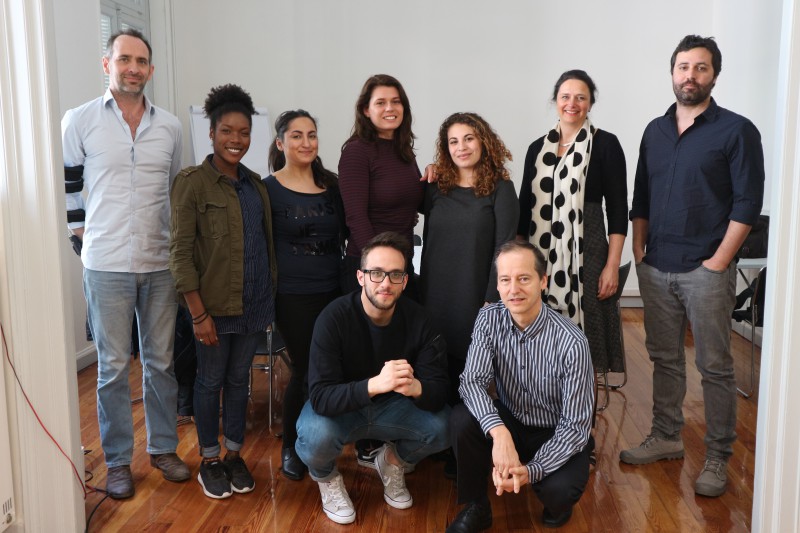Tilburg University students see the refugee crisis up close
Six Tilburg University students have just returned from Greece, where they spent four weeks doing research on urban refugees. Meena Rauf, Isabelle Lebours, Rebecca Pol, Leyla Khadraoui, Stavros Papadeas and Mohamed el Mokharti share their impressions.
Two years after the refugee crisis became a fixture on our front pages and TV screens, tens of thousands of refugees have been left stranded in Greece. Waiting to be relocated to a permanent place elsewhere in Europe, these ‘urban refugees’ have to fend for themselves in the unwelcoming cities of the Greek mainland. Six students traveled to Athens and Thessaloniki to gather the stories of refugees from Syria, Afghanistan, Iraq and other war-torn countries.

The research group
“A woman asked me: I know you’re going back in a few days, can you take my baby with you?”
Raped by smugglers
One of those stories is the tragedy of a 22-year-old Afghan woman with a baby and a two-year-old son. “A human smuggler had made her pregnant”, Meena Rauf says. “She was raped by three smugglers while trying to reach her husband and sister in Germany. And then her sister called to tell her that there was no need for her to come to Germany anymore, because her husband had remarried. Now she has a baby and she basically lives on the street. She can’t return to Afghanistan, because she has a child born out of wedlock. That’s considered a disgrace.”
For Meena, who speaks Farsi and Pashtu and often acted as a translator for the rest of the group, it was a meaningful experience. “I felt grateful that she was willing to share such deeply personal stories with me. The people we talked to trusted us, they told us their stories”, she says. “They hoped we could help them. Fortunately, for this woman, there was something we could do. We bought milk and bread for her baby. She was very happy and grateful. But it’s still tragic. She even asked me: I know you’re going back in a few days, can you take my baby with you?”
Sold to the Taliban
Stavros Papadeas was moved by the story of a man from Afghanistan. “When we met him for an interview, he was very friendly. He really opened his heart to us”, Stavros recalls. “Hearing his story was difficult for us. He told us that he was kidnapped by a group of Taliban fighters. He was raped by six men, and he was sodomized with a knife. His family had decided to sell him to the Taliban.”
The man cried when he told his story. Stavros and Meena cried too. “We realized how strong people can be”, Stavros says. “This man was a family man. He wanted to work and build a life. He wasn’t looking for free money, he wanted to participate in European society. That was both a difficult and beautiful thing to realize.”
“We often felt guilty when we went grocery shopping and bought whatever we wanted”
Different worlds
It took some time for Meena, Isabelle, Rebecca, Leyla, Stavros and Mohamed to get used to the sharp contrast between their own lives and the living conditions of refugees in Greece. The first week of their research was difficult, they say. They frequently talked about ways to help the people they encountered, only to realize that they stood powerless. “After spending the whole day talking to refugees and hearing about their hardships, we would ask each other: what shall we have for dinner? That was conflicting. We often felt guilty when we went grocery shopping and bought whatever we wanted. While these people didn’t have enough money to buy food, we went out to eat at a restaurant. We live in two completely different worlds.”

The student group in Greece
Refugees in Greece live in great uncertainty. “They depend on food from trash cans, and handed-down clothes and mattresses”, Leyla Khadraoui says. “If they have an apartment, they can be kicked out any moment.” Rebecca Pol adds that in Athens, there are neighborhoods where hundreds of refugees are housed in a single building: “They have nothing. There’s no privacy, families are separated by a curtain. In a building we visited, the walls were smeared with poop. It was unimaginable.”
Dignity
“The people we talked to had escaped war”, says Leyla. “They had lived through the worst thing possible. But some people still wanted to go back. They want to regain their dignity. Back home they had a house and a family, but now they’ve lost everything. They don’t want to depend on other people. They don’t want to wait for someone to give them food or money. They’re not dogs, they’re human beings.”
Next week, the students will return to Greece for another two weeks of research. They will use the data they collect to write their master’s theses on the living conditions and coping strategies of urban refugees. Meena has also launched a crowdfunding campaign to raise money for urban refugees in Athens and Thessaloniki. She has already raised €747 euros of the €2000 goal. The money will be used to supply refugees with food, toys and other basic provisions. If you want to help, you can make a donation here.






